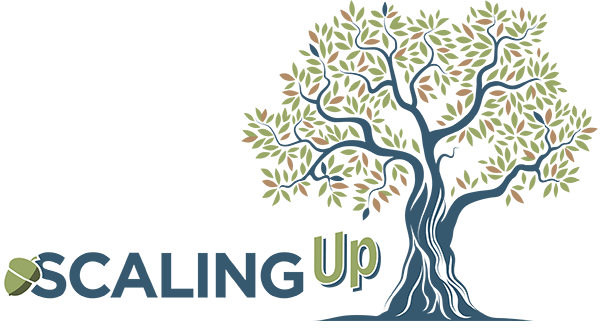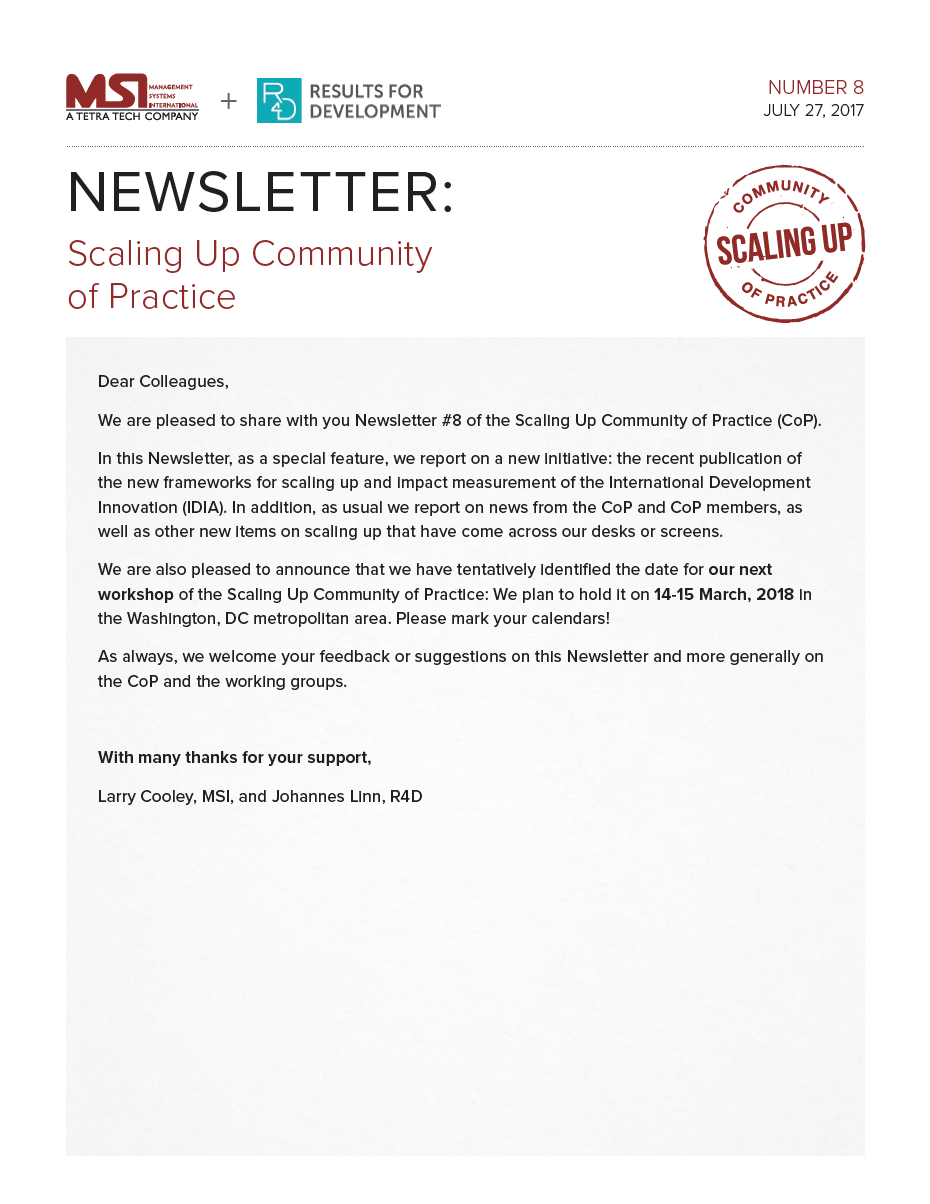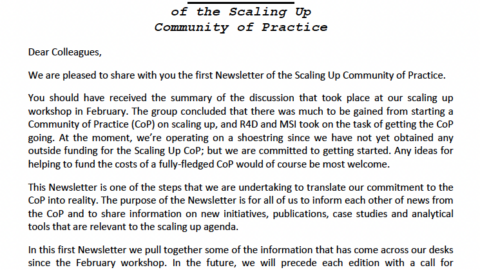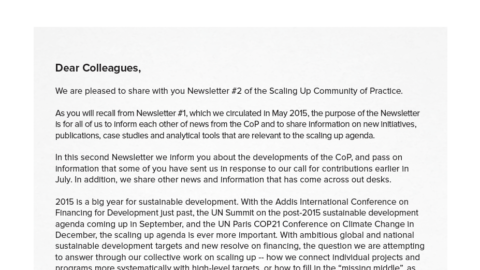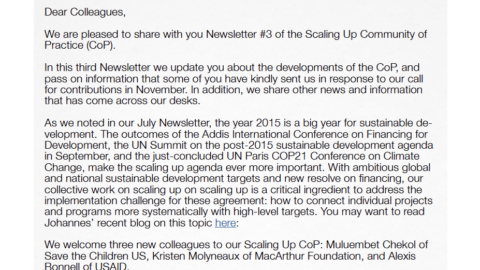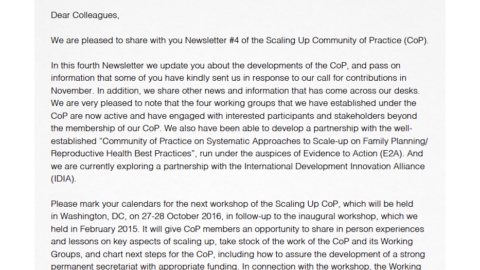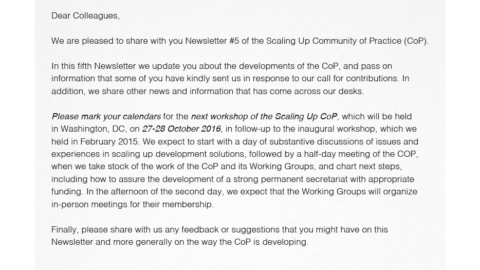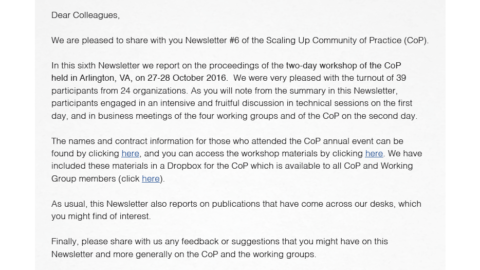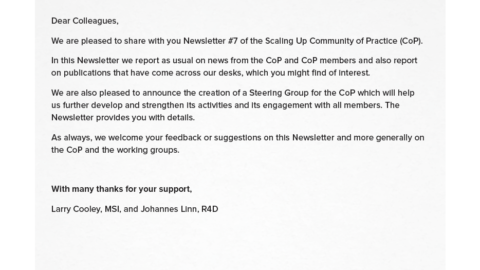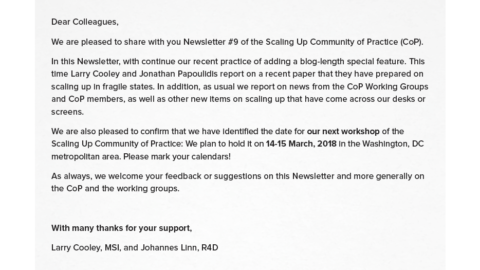Special Feature
Three new publications by IDIA on scaling innovation and measuring impact1
The International Development Alliance (IDIA) is an informal platform for knowledge exchange and collaboration around development innovation. Established in 2015 with a shared mission of “actively promoting and advancing innovation as a means to help achieve sustainable development”, including through the UN’s 2030 Sustainable Development Agenda, it currently comprises the following entities investing resources in the development innovation space: Australian Aid, UNICEF/UNDP, USAID, UKAID (DFID), Canada, World Bank Group, The Rockefeller Foundation, the Bill and Melinda Gates Foundation, SIDA, Grand Challenges Canada, the Global Innovation Fund and Results for Development.
A key contribution IDIA seeks to make is to enhance the global evidence base and build understanding of the role of innovation within international development. To do this, IDIA establishes Working Groups that bring together experts from within and beyond IDIA member agencies to collaboratively develop common platforms for supporting innovation from idea to scale, shared learning and improved impact measurement. In June 2017, IDIA published three documents:
- Insights on Scaling Innovation
- Scaling Innovation – Good Practice Guides
- Insights on Measuring the Impact of Innovation
They can be found on this Web site: http://insights.globalinnovationexchange.org
Insights on Scaling Innovation represent the culmination of a year-long review and synthesis of learning by the IDIA Working Group on Scaling Innovation, facilitated by Thomas Feeny and Johannes Linn at R4D, who also created this report. It focuses on various challenges, lessons learned and practices of funders seeking to take promising development innovations to scale. It draws on the experience and learning of a wide range of bilateral, multilateral, philanthropic and civil society actors who came together in a Working Group on Scaling Innovation facilitated by the International Development Innovation Alliance (IDIA). While it does not represent the formal strategy or approach of any one single agency in the Working Group or IDIA itself, it does reflect areas of overlapping interest and terminology that can be used as a point of reference for interested stakeholders in reflecting on, and enhancing, their own approaches and guidance on scaling innovations.
These insights on scaling have been organized into three discrete (yet complementary and interdependent) areas: first, dividing the scaling process into six overlapping Stages, stretching on a continuum from ideation through to sustainable scale. Second, eight Good Practices have been identified across these stages to help funders of development innovation enhance the impact of their support. Finally, a matrix of Influencing Factors that will either accelerate or constrain the scaling process has been created, with guidance on how funders can use these to initially assess (and then continually monitor) the scalability of an innovation over time. Together, these scaling stages, good practices, and influencing factors provide funders with an experiential (rather than theoretical) architecture for scaling innovation that may be helpful to inform their own approaches.
Scaling Innovation – Good Practice Guides is designed to be read in conjunction with the Insights on Scaling Innovation paper. The eight good practices that are at the heart of the scaling architecture presented in that report are unpacked in the Good Practice Guide in more detail, and provide a curated selection of tips, tricks, tools and resources that can help enhance the practice and impact of those exploring innovation in international development. Each Good Practice Guide adopts the same structure, comprised of the following sections: (i) Relevant scaling stage(s); (ii) Glossary of terms; (iii) Why is this a good practice? (iv) What data/ information do I need? (v) What tools and resources can help me? and (vi) Empirical insights for funders.
Insights on Measuring the Impact of Innovation focuses on various challenges and lessons learned of funders seeking to measure the impact of development innovations they support. It draws on the experience and learning of a wide range of bilateral, multilateral, philanthropic and civil society actors who came together in a Working Group on Measuring Impact facilitated by the International Development Innovation Alliance (IDIA). These Insights provide a broad architecture to help guide funders in navigating the long and complex process of impact measurement, while also offering guidance to help innovators and partner organizations develop/enhance their own impact measurement approaches. They have been synthesized to create a high-level architecture for measuring the impact of innovation that is built around a minimal set of ‘core’ indicators, with ‘lives saved and improved’ being the ultimate measures of success. These indicators are organized in terms of three key impact domains: (1) ‘Impact on Beneficiaries’, ‘Scale’ and ‘Sustainability’, with additional guidance on what to measure when assessing the potential impact of an innovation (the ‘Leading’ Indicators) and what to measure when assessing the actual, achieved impact (the ‘Outcome’ Indicators).
News of the Scaling Up Community of Practice
Sectoral and Thematic Working Groups
Four Working Groups on scaling up in regard to selected topics are active under the umbrella of the Scaling Up Community of Practice. In addition, we have linked up with the Community of Practice on Systematic Approaches to Scale-Up of Family Planning/Reproductive Health Best Practices. Below is a summary of the initiatives currently underway. If you would like to join one or more of these Working Groups, please contact the lead organizers noted in the first column.
| Working group topic | Working group coordinator | Current status of the Working Group (WG) |
|---|---|---|
| Scaling up in Education | Molly Eberhardt (R4D) [email protected] Caitlin Moss (R4D) [email protected] | The newly formed Executive Committee of the Education Working Group will be exploring ways to exchange views and experiences among Working Group members, involving calls centered on specific themes or questions once every few months, depending on interest and capacity. Potential themes that could be addressed during such calls include working with government to move from pilot to scale, scaling up education interventions in humanitarian situations, and maintaining fidelity and quality of a model while scaling. The next Working Group call is expected to be held in the fall of 2017. |
| Scaling Up in Fragile States | Jonathan Papoulidis (World Vision) [email protected] | The Scaling-Up in Fragile States Group began in May 2016 and currently has 16 COP members ranging from bilateral donors, multilateral development banks, universities, think tanks and aid agencies. The Group’s work to date has focused on framing the challenges and opportunities of scaling in fragile states by drawing on our members’ perspectives, priorities and operations. The Group continues to serve as a platform for thought leadership in this space, as well as a repository and distributor of member (and broader community) research, policy reports and other resources that inform scaling in difficult contexts. Looking forward, the Group will increasingly focus on how the principles and practice of resilience, adaptive development, political economy analysis and problem-driven iterative adaptation can enrich approaches to scaling-up in the hardest places. The next meeting will be planned for September/October. While continuing to develop a guidance note on scaling in fragile states, the Group will look for opportunities to stimulate wider discussions with other communities of practice and for a focus on fragility in the context of the Sustainable Development Goals, Leave No One Behind agenda and beyond. |
| Scaling up in Agriculture and Rural Development (ARD) | Maria Elena Mangiafico (IFAD) [email protected] Frank Place (IFPRI) [email protected] Laura Schreeg (USAID) [email protected] Simon Winter (TechnoServe) [email protected] | The ARD Working Group currently includes people representing 15 organizations. It is planning a working group meeting in the near future focusing on identifying common and shared interest areas across knowledge sharing, research and collaboration that members could work on jointly as appropriate. The WG shares information on a dedicated web platform available at: http://www.agriscale4dev.com |
| Monitoring and Evaluation (M&E) for Scaling Up | Larry Cooley (MSI) [email protected] Fred Mills (R4D) [email protected] | On June 7th, the M&E Working Group had a virtual meeting attended by 21 of its members. The agenda included an update on current and upcoming events and substantive discussion of two topics – (1) maximizing learning from case-based scaling experience and (2) enhancing the utility of M&E for adaptive management during scaling. Framing remarks on the first topic were provided by Laura Ghiron who described Expandnet’s experience with Resource Teams and by Larry Cooley (on behalf of Jenny Perlman Robinson) sharing Million Learning’s approach to Real-Time Scaling Labs. Framing remarks on the second topic were provided by John Floretta, drawing on examples from policy support in South Asia and Africa and implementation of a local remedial education model in Zambia, and by Alastair McKechnie who offered an overview of efforts to tailor M&E to the special needs and circumstances of scaling in fragile states. Detailed notes and an audio recording of the 75 minute discussion are available for downloading. |
| Community of Practice on Systematic Approaches to Scale-Up on Family Planning/Reproductive Health Best Practices | Laura J. Ghiron (U.Mich.) [email protected] | The Evidence to Action (E2A) CoP on Scaling is jointly organizing a technical convening on systematic approaches to scaling with the broader CoP on Scaling Up Development Outcomes. The event will be held on August 15th in Washington DC. This convening grows out of recent experience-sharing between the two CoPs. The convening seeks to share recent learning among professionals with experience or strong interest in the field of scale up. Presentation of examples of systematic scale up initiatives through public sector, NGO and commercial pathways from varied fields of global development will set the stage for discussions of similarities and differences in approach and constructive ways forward to ensure wider application of systematic scaling strategies. Invitations were circulated earlier to members. |
Member News
Brookings (Education)
One year on from the launch of the report, Millions Learning: Scaling up quality education in developing countries, the Millions Learning project team in the Brookings Center for Universal Education (CUE) is working hard to implement phase two of the project, which focuses on operationalizing the reports’ recommendations and exploring how to ensure that interventions that improve learning outcomes are taken to scale.
Millions Learning 2.0 Advisory Group: Over the past three months, the team hosted two working meetings to discuss phase two of the Millions Learning project with the Millions Learning Advisory Group, a diverse group of international experts from the public, private, and social sectors chaired by Julia Gillard, former Prime Minister of Australia. The discussion focused primarily on further defining CUE’s role in the proposed Real-time Scaling Labs, identifying potential collaborations and entry points for the labs in country, and examining existing knowledge gaps around translating evidence and innovation into improved policies and practices in education. Over the coming months, the team will partner with local institutions in a number of countries to launch the labs in order to learn from, document, and support the process of scaling as it unfolds in real-time.
Events & Presentations: The team also had the opportunity to co-host and participate in various events and roundtables to share key findings from the Millions Learning research and receive feedback on proposed plans for phase two of the project. As part of CUE’s annual Research and Policy Symposium, the team co-hosted a panel discussion with the Youth Employment Funders’ Group (YEFG) on key findings from their upcoming policy brief, “What works in soft skills development for youth unemployment.” On April 20th, it co-hosted the roundtable Strengthening the Global Education Ecosystem to Foster Education for All with Teach for All. The discussion centered on critical barriers to achieving systemic change on a global scale, analyzed lessons that could be learned from the health sector, and proposed next steps to move this work forward collectively. On May 10th, Jenny Perlman was a panelist at the conference Educating Students for a Diverse and Rapidly Changing World at Harvard University’s Graduate School of Education. The panel discussion on scaling and spreading quality education in the 21st century allowed us to share key findings and next steps of the Millions Learning project as well as learn from colleagues about their own experiences with scaling education initiatives.
Contact: Jenny Perlman Robinson ([email protected])
ExpandNet (Reproductive health)
During the past quarter ExpandNet has continued to work with The Challenge Initiative (TCI) – the “business unusual” approach to scaling up successfully tested family planning interventions for the urban poor in India, East Africa and francophone West Africa. A key component of this work has been to develop toolkits for future implementers which describe the successfully tested interventions and provide simple, practical guidance on how to put them into practice with limited support from external partner organizations. ExpandNet also provided guidance to efforts to scale up access to the single-use injectable hormonal contraception (trade name Sayana Press) in Nigeria, using the ExpandNet tool “Nine steps for developing a scaling up strategy”. This effort confirmed the value of using a systematic and participatory approach to such planning that is led by government and involves key stakeholders. Additionally, in collaboration with the Washington based Evidence to Action (E2A) Project, ExpandNet is assisting stakeholder efforts to scale up task-sharing approaches to the delivery of contraceptive services in Cross River State, Nigeria. ExpandNet/E2A has also been preparing for a scale up-focused technical convening with the MSI/R4D-led CoP for Scaling up Development Outcomes, which is described elsewhere in this newsletter.
Contact: Laura Ghiron (ljghiron@ umich.edu) and Ruth Simmons ([email protected])
Global Solutions Summit (GSS) (General scaling)
Alfred Watkins of the GSS chaired a panel on scaling up technology deployment at the May 2017 UN STI Forum. Here is a brief summary of the discussion:
- Scientific research leading to new discoveries and new technological solutions is only the first step in the process of harnessing STI for implementing the SDGs. The indispensable second step is deploying that new and existing knowledge on a scale that can reach tens of millions, if not hundreds of millions, of people in the next 12 years. For example, we will need to deploy 250,000 microgrids to achieve the Sustainable Energy For All SDG and an even greater number of water purification installations to meet the potable water SDG. Scientists have given us the technical know-how to meet these objectives and new and improved solutions will likely continue to emerge at an accelerating pace. The next step is to deploy this existing and newly-discovered know-how on a scale commensurate with the need.
- Meeting this deployment challenge is not a scientific problem, per se. Rather, as the panelists illustrated, successful deployment programs rest on strengthening four interrelated pillars so that they operate as a coherent deployment ecosystem. Those four pillars are: (i) financial conduits to move capital from where it is located to where it is needed and in the form best-suited for each project; (ii) business models, including franchising social enterprises, to support the deployment process; (iii) entrepreneurs to organize the deployment process; and (iv) digital platforms and other mechanisms to connect suppliers of technology with seekers of technology.
Contact: Alfred Watkins (GSS) (alfred.watkins07@gmail. com)
IFAD (Rural development)
IFAD aims to systematize non-lending activities – knowledge management, partnership and policy engagement – to unlock their potential to scale up country program results. The underlying rationale is that evidence-based results will serve as an incentive in leveraging additional resources from governments, the private sector, other development partners and rural communities themselves, or lead to broader alliances and partnerships that can achieve policy changes and multiple sustainable impacts. In this regard the Fund has recently reflected on the findings of the Evaluation Synthesis report prepared by the Independent Office of Evaluation on IFAD’s Country-level policy dialogue.
https://www.ifad.org/documents/10180/ e0721f2e-f84b-40e5-9526-edbf6b54a9e3
As policy engagement becomes a way to scale up successful approaches developed under IFAD-supported projects and achieve greater impact by shaping the larger policy framework, the Policy team has prepared a step-by-step guidebook and toolkit on how to incorporate country-level policy engagement into country strategies and project design processes. See IFAD’s approach to policy engagement: Teaser | How to do: Incorporate policy engagement into a project | How to do: Incorporate policy engagement into a COSOP | Lessons learned | Guide book
Another means through which the Fund aims to replicate and/or scale up successful rural transformation approaches is through South-South Triangular Cooperation (SSTC). As part of its initiatives on SSTC, IFAD and the Government of Brazil, in partnership with other actors, such as the Food and Agriculture Organization of the United Nations (FAO) and the
United Nations Office for South-South Cooperation (UNOSSC), is organizing an international conference on SSTC entitled “Leveraging Innovations from the Global South to Support Rural Transformation”. It will take place in Brasilia, Brazil on 20-21 November 2017. In order to showcase innovative solutions from different countries and situations, the conference will also include a “marketplace” or exhibition space through which participants will be able to interact directly with, and learn from, innovative rural development solutions providers. To identify such innovative solutions originating from developing countries and that have potential to be replicated in other countries of the Global South, IFAD and its conference partners will be launching a call for proposals for innovative rural development solutions. The call will soon be found on IFAD’s website.
Contact: Maria Elena Mangiafico (IFAD) ([email protected])
IFPRI (nutrition)
On June 28, 2017 IFPRI jointly with Alive & Thrive organized a policy seminar on “Taking It to Scale: Insights from IFPRI’s Research on Improving Nutrition Behaviors in Multiple Contexts” It addressed this key question: Can large-scale initiatives aimed at changing behaviors improve the diet quality of mothers, infants, and young children? Alive & Thrive—a multiyear, global initiative— works to improve maternal, infant, and young child nutrition, using multiple social and behavior-change strategies. Since 2009, IFPRI researchers have conducted a set of rigorous impact- and process-evaluation studies on Alive & Thrive’s large-scale, high-quality behavior change communications interventions in three countries—Bangladesh, Ethiopia, and Vietnam. These studies provide evidence on how such large-scale nutrition initiatives can achieve their goals using strategies that mobilize health workers, mass media, and community groups to shape behavior change. Research findings have been published in leading academic journals.
This seminar presents the key findings from the set of studies, shares insights on the policy and contextual relevance of the results, and discusses the factors that led to the Alive & Thrive successful long-term research partnership.
Presenters, discussants and presentations are found here: http://www.ifpri.org/event/taking-it-scale-insights-ifpris-research-improving-nutrition-behaviors-multiple-contexts
Innovation for Poverty Action (Health)
Reducing Child Mortality with Community Health Promoters in Uganda: An IPA study found that a social entrepreneurship community health worker model in Uganda, called Living Goods Community Health Promoters (CHP), substantially reduced child mortality, improved health knowledge and preventative care measures, and increased the number of visits that CHPs paid to households. Living Goods created the CHP program, and carry it out in partnership with BRAC. The findings persuaded policymakers and funders to scale up the model, enabling Living Goods to expand the program to reach millions across Uganda and to bring the model to Kenya. IPA is currently evaluating this program at scale to see if the same impacts persist when the program is brought to scale. We are also exploring evaluating the approach in other contexts to validate the model, and are currently engaging in conversations with researchers and funders to this end. Read more about how the program works in this blog post by the researchers, and more about the methods and results in the project summary.
Contact: Bethany Park ([email protected])
J-PAL (Measurement and evaluation)
“The Generalization Puzzle” (https://ssir.org/articles/ entry/the_generalizability_puzzle)
The practice of using rigorous scientific evaluations to study solutions to global poverty is relatively young. Although researchers continue to advance our knowledge of the mechanisms at work, confusion about their role and value persists. Having evidence from specific studies is fine and good, but for policy makers, the point is not simply to understand poverty, but to eliminate it. Do decisions always need to be informed by evidence from the local context? What potential and limits do randomized controlled trials have for improving our knowledge and finding effective answers? In this article, Mary Ann Bastes and Rachel Glennerster, authors from J-PAL argue that rigorous impact evaluations tell us a lot about the world, not just the particular contexts in which they are conducted.
Contact: John Floretta (J-PAL) ([email protected])
MacArthur Foundation and MSI (General Scaling)
The MacArthur Foundation is undertaking an ambitious program called 100&Change, a competition for a $100m grant to fund a single proposal that promises real and measurable progress in solving a critical problem of our time. A team of judges scored 800 applications based on criteria of meaningfulness, feasibility, measurability and durability, and the Foundation Board selected 8 semifinalists. Each of these 8 semifinalists received technical assistance from MSI in strengthening and elaborating their scaling plans, and final applications were required to address 7 sets of issues related directly to scaling. Final applications were submitted earlier this month with public presentations and a final decision expected later this year.
Contact: Kristen Molyneaux, MacArthur (kmolynea@ macfound.org) or Larry Cooley, MSI ([email protected])
MercyCorps (General scaling)
In May 2017 MercyCorps and others launched a series of case studies on three social enterprises and how they’ve sought to scale up their impact. They’re available online at www.scalingpathways.com, along with a recording of the launch webinar also in May. The studies address the question what do social enterprises need most to scale up their impact successfully. At the webinar launch of Scaling Pathways, a series of case studies on scaling impact, CASE at Duke University and the leaders of three amazing social enterprises told participants about common roadblocks on the path to scale, strategies to avoid them, and some of their pivots and pitfalls along the way. If you missed the live show, don’t worry! You can view the recording anytime and download the full series at www.scalingpathways.com. The Innovation Investment Alliance, a funding and learning partnership between the Skoll Foundation and USAID’s Global Development Lab, with support from Mercy Corps, and CASE at Duke University will continue to add to this series and provide fuel for your scaling journey.
Contact: Chris Walker (MercyCorps) ([email protected])
Room to Read (Education)
Erin Ganju and Cory Heyman reported as follows on their forthcoming book: Scaling Social Change: A Social Entrepreneur’s Guide to Surviving Start-up and Driving for Global Impact:
Scaling an effective social program requires much more than a good idea and hard work. It requires a strong support system to design it, implement it, train others in its implementation, monitor progress, and adjust the design as necessary. It therefore requires a strong government agency, business, or social enterprise behind it. The challenge for people working in civil society is to grow the enterprise in a reasonable way at the same time as scaling effective outcomes: bridging what can often be a tremendous gap between a well-meaning start-up and mature organization. Cory Heyman and Erin Ganju tackle this challenge in an upcoming book, Scaling Social Change, that will be published late this year or early 2018. They describe the process of growing Room to Read, one of the fastest-growing social enterprises in the international education sector, over the past 17 years. They explain the nuts and bolts of developing a strong organization at different stages of maturity while driving for important social goals. Detailing Room to Read’s many successes and failures over time, Scaling Social Change provides lessons in organizational development for experienced nonprofit executives and budding social entrepreneurs alike. Please be on the lookout soon for this business book for nonprofit leaders.
Save the Children (with USAID) (Nutrition)
In Cambodia, Save the Children is leading the USAIDfunded NOURISH project, which works to accelerate stunting reduction by focusing directly on several of the key causal factors of chronic malnutrition specific to Cambodia—poverty, lack of access to quality food and nutrition services, unsanitary environments, and social norms and practices that work against optimal growth and development. NOURISH developed three national TV spots building on the Grow Together SBCC campaign on multi-sectoral nutrition behaviors, toilet construction and use of small indigenous fish powder for feeding young children. The TV spots reflect key social norms to trigger behavior change on two national television channels. The first two TV spots aired on two national channels this year and the third will air in the coming quarter.
Contact: Erin Shea ([email protected])
UNDP (Innovation)
On 13 June, 2017 UNDP launched its latest report on innovation in UNDP ‘Spark, Scale, Sustain – Innovation for the Sustainable Development Goals’. It showcases more than 40 innovation initiatives across all regions and SDGs.
Contact: Benjamin Kumpf ([email protected])
USAID (General Scaling)
A Million Better Lives Club! USAID and partners want to celebrate innovations that are reaching scale. They are hoping to understand how many innovations in development around the world have impacted and improved more than 1 million lives, or if not yet a million, are on their way to big numbers and big impact!
They want to recognize and celebrate those who have hit this amazing milestone! These do not have to be USAID funded – USAID and partners want to recognize ALL great innovation pursuing scale, domestic US or international!
Anyone is invited to nominate great innovations. Innovations that have reached 100,000 lives or more are eligible to be nominated! The last day for submissions is August 15th. Submission can be made on this Web site by the innovator or their supporters: https://docs.google.com/forms/d/e/1FAIpQLSfy3blZB_ yM213OaUTWkHqcsRnhbXvL7-EGOt7UOge4vtb2fQ/ viewform
Contact: Alexis Bonnell ([email protected])
World Bank (Education)
David Evans, Lead Economist in the Chief Economist’s Office for the Africa Region of the World Bank, recently published three blogs on scaling up in education:
- How do you scale up an effective education intervention? Iteratively, that’s how.
- Scaling Up Effective Programs – Kenya and Liberia Edition
- The promise of teacher coaching and the peril of going to scale
Other News
A very informative CSIS report entitled What Can the United States Learn From the Scaling Up Nutrition (SUN) Movement: Examining Country Leadership in Zambia, Kenya and Bangladesh, authored by Rebecca Brown, Tamsin Walters, and Jane Keylock, was issued in July and discussed at a CSIS event on July 26th.
SUN is a “network of networks” dedicated to scaling up enhanced nutrition outcomes. Launched in 2010, it is supported by a Global Secretariat and a separate, small, Civil Society Secretariat. It also incorporates a Business Network, and a Donor Network. Countries are encouraged and supported to (1) develop and adopt a multi-sectoral Common Results Framework that draws on inputs from multiple stakeholders and incorporates agriculture, water, health, etc. efforts to affect nutrition outcomes; (2) advocate for, manage against, and report on progress using these frameworks; and (3) take advantage of SUN’s global structure to advocate collectively on global issues related to nutrition and to promote peer-to-peer learning. 59 countries are members of the SUN movement, each with a designated Focal Point, and 39 of those countries also have “civil society alliances”.
The specific interventions selected for attention and scaling differ by country, and are sometimes supported through pooled donor resources.
The SUN network has developed and compiled extensive materials on scaling available through their website and likely to be of interest to people in other sectors.
